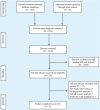Effect of family-centered interventions for perinatal depression: an overview of systematic reviews
- PMID: 37324817
- PMCID: PMC10267375
- DOI: 10.3389/fpsyt.2023.1094360
Effect of family-centered interventions for perinatal depression: an overview of systematic reviews
Abstract
Objective: This study aimed to evaluate and conclude the quality of critically systematic reviews (SRs) of the efficacy of family-centered interventions on perinatal depression.
Methods: SRs of the efficacy of family-centered interventions on perinatal depression were systematically searched in nine databases. The retrieval period was from the inception of the database to December 31, 2022. In addition, two reviewers conducted an independent evaluation of the quality of reporting, bias risk, methodologies, and evidence using ROBIS (an instrument for evaluating the bias risk of SRs), Preferred Reporting Items for Systematic Reviews and Meta-Analyses (PRISMA), AMSTAR 2 (an assessment tool for SRs), and grading of recommendations, assessment, development and evaluations (GRADE).
Results: A total of eight papers satisfied the inclusion criteria. In particular, AMSTAR 2 rated five SRs as extremely low quality and three SRs as low quality. ROBIS graded four out of eight SRs as "low risk." Regarding PRISMA, four of the eight SRs were rated over 50%. Based on the GRADE tool, two out of six SRs rated maternal depressive symptoms as "moderate;" one out of five SRs rated paternal depressive symptoms as "moderate;" one out of six SRs estimated family functioning as "moderate," and the other evidence was rated as "very low" or "low." Of the eight SRs, six (75%) reported that maternal depressive symptoms were significantly reduced, and two SRs (25%) were not reported.
Conclusion: Family-centered interventions may improve maternal depressive symptoms and family function, but not paternal depressive symptoms. However, the quality of methodologies, evidence, reporting, and bias of risk in the included SRs of family-centered interventions for perinatal depression was not satisfactory. The above-mentioned demerits may negatively affect SRs and then cause inconsistent outcomes. Therefore, SRs with a low risk of bias, high-quality evidence, standard reporting, and strict methodology are necessary to provide evidence of the efficacy of family-centered interventions for perinatal depression.
Keywords: efficacy; family-centered interventions; overview of systematic reviews; perinatal depression; quality.
Copyright © 2023 He, Soh, Yu, Chen and Dong.
Conflict of interest statement
The authors declare that the research was conducted in the absence of any commercial or financial relationships that could be construed as a potential conflict of interest.
Similar articles
-
Effectiveness and safety of manual therapy for knee osteoarthritis: An overview of systematic reviews and meta-analyses.Front Public Health. 2023 Feb 24;11:1081238. doi: 10.3389/fpubh.2023.1081238. eCollection 2023. Front Public Health. 2023. PMID: 36908468 Free PMC article.
-
Effectiveness and safety of acupuncture for treating functional constipation: An overview of systematic reviews.J Integr Med. 2022 Jan;20(1):13-25. doi: 10.1016/j.joim.2021.11.001. Epub 2021 Nov 7. J Integr Med. 2022. PMID: 34838459 Review.
-
Tai Chi for improving balance and reducing falls: An overview of 14 systematic reviews.Ann Phys Rehabil Med. 2020 Nov;63(6):505-517. doi: 10.1016/j.rehab.2019.12.008. Epub 2020 Jan 22. Ann Phys Rehabil Med. 2020. PMID: 31981834
-
Tai Chi for Chronic Obstructive Pulmonary Disease (COPD): An Overview of Systematic Reviews.Int J Gen Med. 2021 Jun 29;14:3017-3033. doi: 10.2147/IJGM.S308955. eCollection 2021. Int J Gen Med. 2021. PMID: 34234531 Free PMC article. Review.
-
Efficacy and safety of acupuncture therapy for psoriasis: an overview of systematic reviews.Ann Palliat Med. 2021 Oct;10(10):10804-10820. doi: 10.21037/apm-21-2523. Ann Palliat Med. 2021. PMID: 34763442 Review.
Cited by
-
Canadian Network for Mood and Anxiety Treatments 2024 Clinical Practice Guideline for the Management of Perinatal Mood, Anxiety, and Related Disorders: Guide de pratique 2024 du Canadian Network for Mood and Anxiety Treatments pour le traitement des troubles de l'humeur, des troubles anxieux et des troubles connexes périnatals.Can J Psychiatry. 2025 Jun;70(6):429-489. doi: 10.1177/07067437241303031. Epub 2025 Feb 12. Can J Psychiatry. 2025. PMID: 39936923 Free PMC article.
References
Publication types
LinkOut - more resources
Full Text Sources


